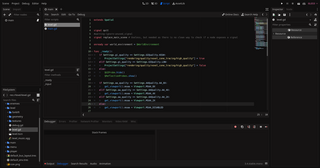Related Research Articles

BASIC is a family of general-purpose, high-level programming languages designed for ease of use. The original version was created by John G. Kemeny and Thomas E. Kurtz at Dartmouth College in 1963. They wanted to enable students in non-scientific fields to use computers. At the time, nearly all computers required writing custom software, which only scientists and mathematicians tended to learn.
VBScript is a deprecated programming language for scripting on Microsoft Windows using Component Object Model (COM) based on classic Visual Basic and Active Scripting.
Visual Basic for Applications (VBA) is an implementation of Microsoft's event-driven programming language Visual Basic 6.0 built into most desktop Microsoft Office applications. Although based on pre-.NET Visual Basic, which is no longer supported or updated by Microsoft, the VBA implementation in Office continues to be updated to support new Office features. VBA is used for professional and end-user development due to its perceived ease-of-use, Office's vast installed userbase, and extensive legacy in business.
In computing, cross-platform software is computer software that is designed to work in several computing platforms. Some cross-platform software requires a separate build for each platform, but some can be directly run on any platform without special preparation, being written in an interpreted language or compiled to portable bytecode for which the interpreters or run-time packages are common or standard components of all supported platforms.

ActiveX is a deprecated software framework created by Microsoft that adapts its earlier Component Object Model (COM) and Object Linking and Embedding (OLE) technologies for content downloaded from a network, particularly from the World Wide Web. Microsoft introduced ActiveX in 1996. In principle, ActiveX is not dependent on Microsoft Windows operating systems, but in practice, most ActiveX controls only run on Windows. Most also require the client to be running on an x86-based computer because ActiveX controls contain compiled code.
JScript is Microsoft's legacy dialect of the ECMAScript standard that is used in Microsoft's Internet Explorer web browser.
The Microsoft Windows Script Host (WSH) is an automation technology for Microsoft Windows operating systems that provides scripting abilities comparable to batch files, but with a wider range of supported features. This tool was first provided on Windows 95 after Build 950a on the installation discs as an optional installation configurable and installable by means of the Control Panel, and then a standard component of Windows 98 and subsequent and Windows NT 4.0 Build 1381 and by means of Service Pack 4. The WSH is also a means of automation for Internet Explorer via the installed WSH engines from IE Version 3.0 onwards; at this time VBScript became means of automation for Microsoft Outlook 97. The WSH is also an optional install provided with a VBScript and JScript engine for Windows CE 3.0 and following and some third-party engines including Rexx and other forms of Basic are also available.
Active Scripting is the technology used in Windows to implement component-based scripting support. It is based on OLE Automation and allows installation of additional scripting engines in the form of COM modules.
Microsoft Windows SDK, and its predecessors Platform SDK, and .NET Framework SDK, are software development kits (SDKs) from Microsoft that contain documentation, header files, libraries, samples and tools required to develop applications for Microsoft Windows and .NET Framework. Platform SDK specializes in developing applications for Windows 2000, XP and Windows Server 2003. .NET Framework SDK is dedicated to developing applications for .NET Framework 1.1 and .NET Framework 2.0. Windows SDK is the successor of the two and supports developing applications for Windows XP and later, as well as .NET Framework 3.0 and later.
This is a comparison of widget engines. This article is not about widget toolkits that are used in computer programming to build graphical user interfaces.
The Speech Application Programming Interface or SAPI is an API developed by Microsoft to allow the use of speech recognition and speech synthesis within Windows applications. To date, a number of versions of the API have been released, which have shipped either as part of a Speech SDK or as part of the Windows OS itself. Applications that use SAPI include Microsoft Office, Microsoft Agent and Microsoft Speech Server.

Visual Basic (VB) before .NET, sometimes referred to as Classic Visual Basic, is a third-generation programming language, based on BASIC, and an integrated development environment (IDE), from Microsoft for Windows known for supporting rapid application development (RAD) of graphical user interface (GUI) applications, event-driven programming and both consumption and development of components via the Component Object Model (COM) technology.
ActivePerl is a distribution of Perl from ActiveState for Windows, macOS, Linux, Solaris, AIX and HP-UX.

In computing, a script is a relatively short and simple set of instructions that typically automate an otherwise manual process. The act of writing a script is called scripting. Scripting language or script language describes a programming language that it is used for scripting.

Rexx is a programming language that can be interpreted or compiled. It was developed at IBM by Mike Cowlishaw. It is a structured, high-level programming language designed for ease of learning and reading. Proprietary and open source Rexx interpreters exist for a wide range of computing platforms; compilers exist for IBM mainframe computers.

The Chromium Embedded Framework (CEF) is an open-source software framework for embedding a Chromium web browser within another application. This enables developers to add web browsing functionality to their application, as well as the ability to use HTML, CSS, and JavaScript to create the application's user interface.
References
- ↑ "WinWrap® | Home". www.winwrap.com. Retrieved 2022-02-17.
- ↑ "WinWrap® | WinWrap® Basic Scripting Engine Version 10". www.winwrap.com. Retrieved 2022-02-17.
- ↑ Host Explorer 4 documentation
- ↑ Hummingbird 13 documentation